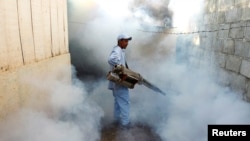Brazil and Latin America are recording lower numbers of Zika infections than last year, but all countries must remain vigilant against the virus, which can cause birth defects, the World Health Organization said Wednesday.
The viral disease carried by mosquitoes has spread to more than 60 countries and territories since an outbreak was identified in Brazil in 2015, raising alarm over its ability to cause microcephaly as well as Guillain-Barre syndrome.
"The prevalence of Zika is dropping, certainly in the Americas," Ian Clarke, WHO incident manager for Zika, said at a news briefing.
He said it was not clear why infection rates were falling. "The anticipation was that we would see a second wave, certainly in Brazil, and we haven't seen it. And we don't believe this is because we're not looking. There's a lot of surveillance ongoing," Clarke said.
Further research was needed, he said, into such issues as whether there was a "natural immunity" because of previous exposure.
Wednesday marked the first anniversary of WHO's declaration that Zika constituted an international emergency. It lifted that designation in November while maintaining its advice for pregnant women and travelers.
To date, 29 countries have reported thousands of babies born with Zika-linked microcephaly, which causes abnormally small-sized heads, often signifying arrested brain development.
'Expect to see outbreaks'
Long-term efforts to fight the disease are required, such as against other infectious diseases, including malaria and dengue fever, Clarke said. "We should expect to see outbreaks. We saw it in Singapore, we will see it again."
Angola said last month that it had recorded its first two cases of Zika virus.
"In a couple of other countries we're doing some quite intensive surveillance work — Tanzania and some others — where we know there is the vector [the aedes aegypti mosquito], we know that there is chikungunya [another virus transmitted by mosquitoes], so really [we're] looking to see if we can find Zika," Clarke said.
There is no preventive treatment against Zika, but drug companies are rushing to develop a vaccine.
There are about 40 vaccine candidates, and five are entering or about to enter initial testing for safety and ability to induce an immune response, said WHO's Dr. Bernadette Murgue.
The five experimental vaccines, as listed on the WHO website, are made by Gene One Life Science / Inovio Pharmaceuticals; Moderna Therapeutics; and by the U.S. National Institute of Allergy and Infectious Diseases. Murgue said it would take at least two to three years before such vaccines could be registered for human use.





